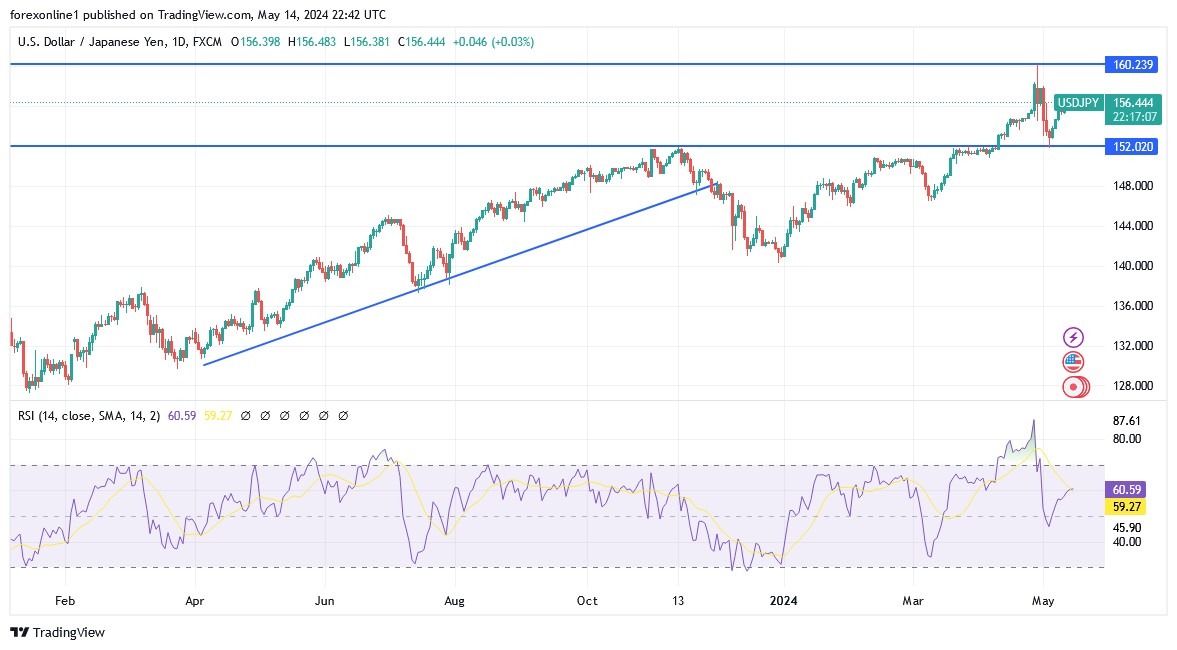- The Japanese yen fell again, surpassing 156 yen to the dollar, hitting its lowest level in two weeks, raising concerns about the possibility of Japanese authorities intervening again to support the currency.
- In this regard, Japanese Finance Minister Shunichi Suzuki said that the government is coordinating with the Bank of Japan to ensure consistent policy goals when it comes to foreign exchange.
- He added that they are taking all possible measures to closely monitor yen movements.
Earlier this month, the Japanese yen rose sharply after falling to 160 yen to the US dollar due to suspected government interference, with Bank of Japan data indicating that it spent nearly $60 billion to defend the currency. However, the yen has now given back about two-thirds of those gains as the huge interest rate differential between Japan and other major economies spurs investors to borrow yen and invest in higher-yielding currencies.
According to forex trading platforms, the USD/JPY exchange rate continued its remarkable rebound ahead of the release of key US inflation figures and Japanese GDP figures. It has risen for three consecutive days and is hovering near its highest level since May 1st.
In general, the US dollar/Japanese yen exchange rate will be in the spotlight this week as investors focus on the upcoming US inflation data scheduled for release on Wednesday. Economists polled by Reuters believe US inflation remained stubbornly high in April as the costs of energy, housing, insurance, and medical care rose. Moreover, the median estimate is that headline CPI slowed to 3.4% in April from the previous 3.5% while core CPI slowed to 3.6% from 3.8%.
If these numbers are accurate, this means that inflation has remained stubbornly above the US Federal Reserve's target of 2%.
Correspondingly, this will mean that the United States is stuck in a state of stagflation, which is characterized by high inflation rates and slow economic growth. Also, the latest data revealed that the economy witnessed growth of only 1.6% in the first quarter, which is less than the fourth quarter’s growth of 3.4%. Furthermore, the latest figures showed that consumer confidence has collapsed to its lowest level since 2022 as concerns about inflation persist. Manufacturing and services PMIs fell into contraction territory in April.
Therefore, if inflation numbers come in stronger than estimates, it means that the US Federal Reserve will choose to leave interest rates higher for a longer period. On the other hand, if inflation slows, the Fed will likely start cutting interest rates in the third quarter.
Top Forex Brokers
The USD/JPY exchange rate will also react to the upcoming Japanese GDP numbers scheduled for release tomorrow, Thursday. Economists polled by Reuters expect the report to reveal a contraction of the economy by 0.4% monthly and 1.5% on an annual basis in the first quarter. Ultimately, these numbers are likely to put more pressure on the Bank of Japan as it faces a weak yen.
USD/JPY Technical Analysis and Expectations Today:
The daily chart shows that the USD/JPY exchange rate is on a strong upward trend, indicating that interventions in the Japanese currency have not been successful. Recently, it jumped above the key support level at 151.88, its highest swing of 2023, meaning it formed a breakout and retest pattern. Also, the pair jumped above the 50-day Exponential Moving Average (EMA) while the Relative Strength Index (RSI) moved slightly above the neutral level. Consistently, the Average Directional Index (ADX) has pointed upward, indicating that this pair has upward momentum. Therefore, the outlook remains bullish, as the next target will be at resistance 160.25, which was its swing high on April 29.
Ready to trade our daily Forex analysis? We’ve made a list of the best forex trading accounts worth trading with.

